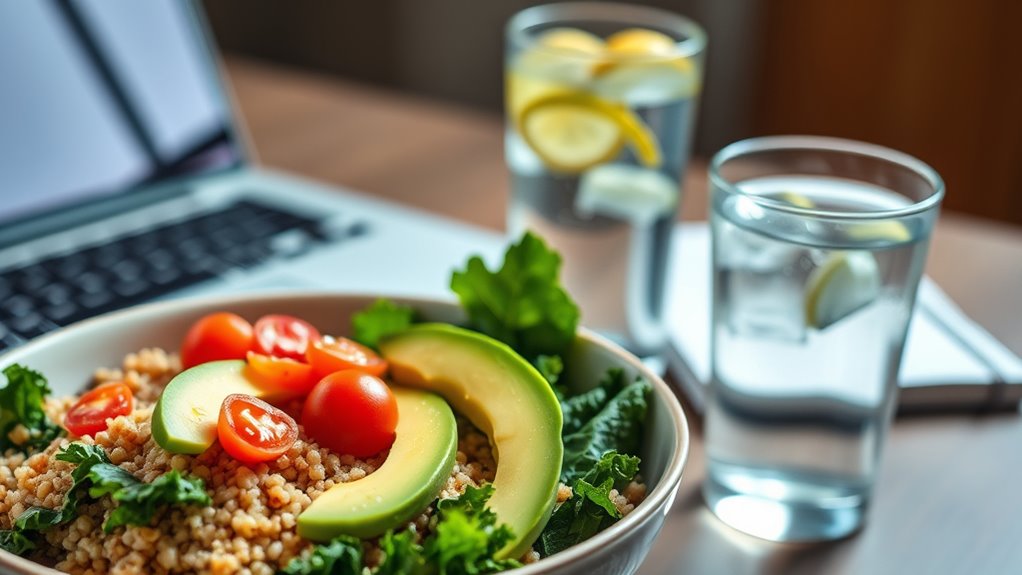Your lunch choices impact your energy, focus, and alertness all afternoon. Opt for complex carbs like whole grains and vegetables, which release energy slowly and keep you steady. Including lean proteins and healthy fats stabilizes blood sugar and prevents crashes. Avoid sugary snacks and simple carbs that cause quick spikes and drops. Proper portion sizes and hydration also support sustained energy. Keep exploring to discover how you can optimize your meals for better afternoon performance.
Key Takeaways
- Choosing complex carbohydrates, proteins, and healthy fats provides sustained energy and prevents post-lunch crashes.
- Simple carbs cause rapid blood sugar spikes, leading to quick energy followed by fatigue.
- Proper portion sizes and fiber-rich foods help stabilize digestion and maintain alertness.
- Hydration during lunch supports consistent energy levels and mental focus.
- Personalizing meal choices based on individual responses optimizes energy and afternoon productivity.

Have you ever wondered why some lunches boost your energy while others leave you sluggish? It all comes down to what you choose to put on your plate and how your body processes those foods. When you eat, your body works to break down the nutrients, turning them into fuel for your brain and muscles. The key is selecting meals that provide a steady release of energy, rather than quick spikes followed by crashes.
Carbohydrates are often your primary source of energy, but not all carbs are created equal. Simple carbs, like sugary snacks or white bread, cause rapid spikes in blood sugar, leading to a quick burst of energy followed by a crash that makes you feel tired. On the other hand, complex carbs found in whole grains, vegetables, and beans digest more slowly, providing a more consistent energy flow that keeps you alert and focused through the afternoon.
Choose complex carbs like whole grains and vegetables for steady afternoon energy.
Protein also plays a vital role in maintaining your energy levels. Incorporating lean sources like chicken, fish, eggs, or plant-based options can help stabilize blood sugar and keep hunger at bay. When your meal contains protein, it slows down the digestion process, preventing those energy dips.
Healthy fats, such as avocados, nuts, and olive oil, contribute to sustained energy because they’re digested more gradually and support brain function. By balancing these macronutrients—carbohydrates, proteins, and fats—you create a meal that fuels you effectively without causing the mid-afternoon slump.
Timing and portion size are equally important. Overeating can divert blood flow toward digestion, making you feel sluggish and lethargic. On the flip side, eating too little might leave you hungry and unable to concentrate. Aim for a moderate portion that satisfies your hunger without overloading your digestive system.
It’s also beneficial to include fiber-rich foods, which slow digestion and promote steady energy release. Hydration plays a part as well; drinking water during your lunch helps regulate your energy levels and keeps you alert.
Finally, pay attention to your body’s response. Notice how different foods affect your energy and focus. Some people find that a salad with lean protein and a drizzle of olive oil keeps them energized, while others might prefer a whole-grain wrap with hummus and vegetables. Experimenting with your lunch choices allows you to discover what fuels you best.
When you understand the science behind your meal, you can make smarter decisions that power your afternoon, keeping you motivated and productive until dinner.
Frequently Asked Questions
How Does Lunch Timing Affect Energy Levels Throughout the Afternoon?
Your lunch timing directly impacts your energy levels in the afternoon. Eating too early might leave you feeling sluggish later, while waiting too long can cause a dip in blood sugar and fatigue.
Ideally, you should have lunch around mid-day to maintain steady energy. Consuming a balanced meal with protein, healthy fats, and carbs helps sustain your alertness and prevents mid-afternoon crashes.
Are There Specific Foods That Enhance Mental Focus After Lunch?
Certain foods can boost your mental focus after lunch. You should include lean proteins like chicken or fish, which provide amino acids that support brain function.
Whole grains such as oats and brown rice release energy slowly, keeping you alert longer.
Incorporate healthy fats from nuts, seeds, or avocados, which improve cognitive performance.
Adding fruits rich in antioxidants, like berries, can further sharpen your attention and sustain mental clarity throughout the afternoon.
What Are the Best Hydration Strategies During Lunch?
During lunch, staying hydrated is key to maintaining energy and focus. You should aim to drink water consistently, taking small sips throughout your meal.
Avoid sugary drinks that cause energy crashes.
Incorporate hydrating foods like fruits and vegetables, which provide extra fluids and nutrients.
If you’re active or in a hot environment, consider electrolyte drinks to replenish lost minerals.
Proper hydration keeps your mind sharp and your body energized for the rest of the day.
How Does Lunch Impact Long-Term Health and Weight Management?
Lunch plays a vital role in your long-term health and weight management. When you choose nutrient-rich foods, you support your body’s functions and prevent chronic diseases.
Skipping or opting for unhealthy options can lead to weight gain and health issues over time. By maintaining balanced, portion-controlled lunches, you foster good habits that help you stay energized, manage weight effectively, and promote overall well-being in the long run.
Can Certain Lunch Choices Improve Mood and Reduce Afternoon Fatigue?
You can boost your mood and cut afternoon fatigue by choosing nutrient-rich foods like lean proteins, whole grains, and fruits. These options provide steady energy and release mood-enhancing nutrients such as omega-3s and vitamins.
Avoid heavy, sugary, or processed foods that cause energy crashes. By making smarter lunch choices, you’ll feel more alert, happier, and ready to tackle the rest of your day with enthusiasm and focus.
Conclusion
Now that you know how lunch fuels your afternoon, imagine what happens when you choose the right foods. Will you stick with the usual, or will you unleash your full potential with smarter choices? The power to transform your energy and focus lies in your hands—right at lunchtime. So, next time you sit down to eat, ask yourself: are you about to just refuel, or are you about to power up for what’s next? The choice is yours.









